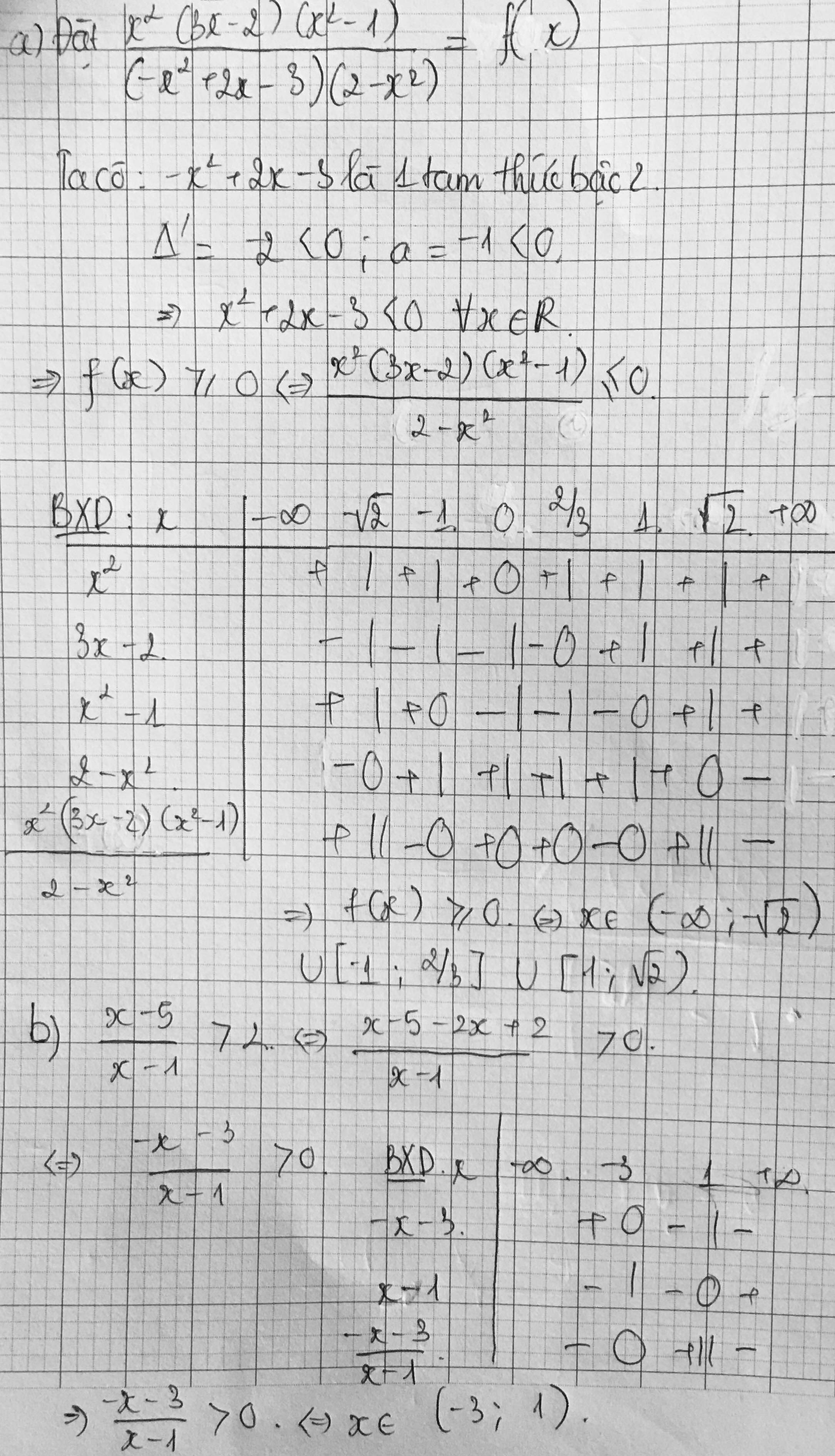Giải bất phương trình \(\left(x-2\right)^2\left(x-5\right)\ge0\)
TD
Những câu hỏi liên quan
cho hàm số \(f\left(x\right)=x^3-3x^2+2\)
a, giải bất phương trình \(f'\left(x\right)\le0\)
b, giải phương trình \(f'=\left(x^2-3x+2\right)=0\)
c, đặt \(g\left(x\right)=f\left(1-2x\right)+x^2-x+2022\) giải bất phương trình\(g'\left(x\right)\ge0\)
\(a,f'\left(x\right)=3x^2-6x\\ f'\left(x\right)\le0\Leftrightarrow3x^2-6x\le0\\ \Leftrightarrow3x\left(x-2\right)\le0\Leftrightarrow0\le x\le2\)
Đúng 2
Bình luận (0)
Lời giải:
a. $f'(x)\leq 0$
$\Leftrightarrow 3x^2-6x\leq 0$
$\Leftrightarrow x(x-2)\leq 0$
$\Leftrightarrow 0\leq x\leq 2$
b.
$f'(x)=x^2-3x+2=0$
$\Leftrightarrow 3x^2-6x=x^2-3x+2=0$
$\Leftrightarrow 3x(x-2)=(x-1)(x-2)=0$
$\Leftrightarrow x-2=0$
$\Leftrightarrow x=2$
c.
$g(x)=f(1-2x)+x^2-x+2022$
$g'(x)=(1-2x)'f(1-2x)'_{1-2x}+2x-1$
$=-2[3(1-2x)^2-6(1-2x)]+2x-1$
$=-24x^2+2x+5$
$g'(x)\geq 0$
$\Leftrightarrow -24x^2+2x+5\geq 0$
$\Leftrightarrow (5-12x)(2x-1)\geq 0$
$\Leftrightarrow \frac{-5}{12}\leq x\leq \frac{1}{2}$
Đúng 1
Bình luận (0)
Giải bất phương trình:
\(a,\log_{0,1},1\left(x^2+x-2\right)>\log_{0,1}\left(x+3\right)\)
\(b,\log_{\dfrac{1}{3}}\left(x^2-6x+5\right)+2\log_3\left(2-x\right)\ge0\)
a. Vì \(0< 0,1< 1\) nên bất phương trình đã cho
\(\Leftrightarrow0< x^2+x-2< x+3\)
\(\Leftrightarrow\left\{{}\begin{matrix}x^2+x-2>0\\x^2-5< 0\end{matrix}\right.\)
\(\Leftrightarrow\left\{{}\begin{matrix}\left[{}\begin{matrix}x< -2\\x>1\end{matrix}\right.\\-\sqrt{5}< x< \sqrt{5}\end{matrix}\right.\)
\(\Leftrightarrow\left\{{}\begin{matrix}-\sqrt{5}< x< -2\\1< x< \sqrt{5}\end{matrix}\right.\)
Vậy tập nghiệm của bất phương trình là \(S=\left\{-\sqrt{5};-2\right\}\) và \(\left\{1;\sqrt{5}\right\}\)
b. Điều kiện \(\left\{{}\begin{matrix}2-x>0\\x^2-6x+5>0\end{matrix}\right.\)
Ta có:
\(log_{\dfrac{1}{3}}\left(x^2-6x+5\right)+2log^3\left(2-x\right)\ge0\)
\(\Leftrightarrow log_{\dfrac{1}{3}}\left(x^2-6x+5\right)\ge log_{\dfrac{1}{3}}\left(2-x\right)^2\)
\(\Leftrightarrow x^2-6x+5\le\left(2-x\right)^2\)
\(\Leftrightarrow2x-1\ge0\)
Bất phương trình tương đương với:
\(\left\{{}\begin{matrix}x^2-6x+5>0\\2-x>0\\2x-1\ge0\end{matrix}\right.\) \(\Leftrightarrow\left\{{}\begin{matrix}\left[{}\begin{matrix}x< 1\\x>5\end{matrix}\right.\\x< 2\\x\ge\dfrac{1}{2}\end{matrix}\right.\)
\(\Leftrightarrow\dfrac{1}{2}\le x< 1\)
Vậy tập nghiệm của bất phương trình là: \(\left(\dfrac{1}{2};1\right)\)
Đúng 3
Bình luận (0)
giải bất phương trình\(\left\{{}\begin{matrix}\left(x^2-4\right)\left(x^2+1\right)\ge0\\\left(x+1\right)\left(3x^2-x+1\right)< 0\end{matrix}\right.\)
Vì $3x^2-x+1>0,x^2+1>0$
$\to \begin{cases}x^2 \geq 4\x<-1\\\end{cases}$
$\to \begin{cases}\left[ \begin{array}{l}x \geq 2\\x \leq -2\end{array} \right.\\x<-1\\\end{cases}$
$\to x \leq -2$
Vậy tập xác định của phương trình là `(-oo,-2]`
Đúng 0
Bình luận (1)
giải bất phương trình \(\left(\sqrt{13}-\sqrt{2x^2-2x+5}-\sqrt{2x^2-4x+4}\right)\left(x^6-x^3+x^2-x+1\right)\ge0\)
Do \(x^6-x^3+x^2-x+1=\left(x^3-\dfrac{1}{2}\right)^2+\left(x-\dfrac{1}{2}\right)^2+\dfrac{1}{2}>0\) ; \(\forall x\) nên BPT tương đương:
\(\sqrt{13}-\sqrt{2x^2-2x+5}-\sqrt{2x^2-4x+4}\ge0\)
\(\Leftrightarrow\sqrt{4x^2-4x+10}+\sqrt{4x^2-8x+8}\le\sqrt{26}\) (1)
Ta có:
\(VT=\sqrt{\left(2x-1\right)^2+3^2}+\sqrt{\left(2-2x\right)^2+2^2}\ge\sqrt{\left(2x-1+2-2x\right)^2+\left(3+2\right)^2}=\sqrt{26}\) (2)
\(\Rightarrow\left(1\right);\left(2\right)\Rightarrow\sqrt{4x^2-4x+10}+\sqrt{4x^2-8x+8}=\sqrt{26}\)
Dấu "=" xảy ra khi và chỉ khi \(2\left(2x-1\right)=3\left(2-2x\right)\Leftrightarrow x=\dfrac{4}{5}\)
Vậy BPT có nghiệm duy nhất \(x=\dfrac{4}{5}\)
Đúng 1
Bình luận (0)
Giải các bất phương trình sau:
a)\(\left(x^2+3x-4\right)\left(3-2x\right)\)<0
b) \(\dfrac{x^2+3x+4}{x^2-2}\ge0\)
c) \(\dfrac{x\left(x^2+4x+4\right)}{x^2-1}\ge0\)
a. TH1:
\(\left\{{}\begin{matrix}x^2+3x-4< 0\\3-2x>0\end{matrix}\right.\) \(\Leftrightarrow\left\{{}\begin{matrix}\left[{}\begin{matrix}x< 1\\x>-4\end{matrix}\right.\\x>\dfrac{3}{2}\end{matrix}\right.\)
TH2:
\(\left\{{}\begin{matrix}x^2+3x-4>0\\3-2x< 0\end{matrix}\right.\) \(\Leftrightarrow\left\{{}\begin{matrix}\left[{}\begin{matrix}x>1\\x< -4\end{matrix}\right.\\x< \dfrac{3}{2}\end{matrix}\right.\)
Vậy nghiệm của BPT:
\(\left\{{}\begin{matrix}\left[{}\begin{matrix}x< 1\\x>-4\end{matrix}\right.\\x>\dfrac{3}{2}\end{matrix}\right.\) \(\left\{{}\begin{matrix}\left[{}\begin{matrix}x>1\\x< -4\end{matrix}\right.\\x< \dfrac{3}{2}\end{matrix}\right.\)
Đúng 0
Bình luận (0)
Giải các bất phương trình, hệ phương trìnha) dfrac{x^2left(3x-2right)left(x^2-1right)}{left(-x^2+2x-3right)left(2-xright)^2}ge0b) dfrac{x-5}{x-1}2c) 2x-sqrt{x^2-5x-14} 1d) x+sqrt{x^2-4x-5} 4e) left{{}begin{matrix}left(4-xright)left(x^2-2x-3right) 0x^2geleft(x^2-x-3right)^2end{matrix}right.
Đọc tiếp
Giải các bất phương trình, hệ phương trình
a) \(\dfrac{x^2\left(3x-2\right)\left(x^2-1\right)}{\left(-x^2+2x-3\right)\left(2-x\right)^2}\ge0\)
b) \(\dfrac{x-5}{x-1}>2\)
c) \(2x-\sqrt{x^2-5x-14}< 1\)
d) \(x+\sqrt{x^2-4x-5}< 4\)
e) \(\left\{{}\begin{matrix}\left(4-x\right)\left(x^2-2x-3\right)< 0\\x^2\ge\left(x^2-x-3\right)^2\end{matrix}\right.\)
Bài 1. Giải các bất phương trình sau 1) dfrac{2x-1}{x+1}-2 0 2) dfrac{x^2-2x+5}{x-2}-x+1ge03) dfrac{left(1+2xright)left(x-3right)}{left(2x+3right)left(1-xright)}le0 4) left|2x-3right|5 5)left|1-2xright|le46) left|3x+1right|x-2
Đọc tiếp
Bài 1. Giải các bất phương trình sau 1) \(\dfrac{2x-1}{x+1}-2< 0\) 2) \(\dfrac{x^2-2x+5}{x-2}-x+1\ge0\)
3) \(\dfrac{\left(1+2x\right)\left(x-3\right)}{\left(2x+3\right)\left(1-x\right)}\le0\) 4) \(\left|2x-3\right|>5\) 5)\(\left|1-2x\right|\le4\)
6) \(\left|3x+1\right|>x-2\)
\(\dfrac{2x-1}{x+1}-2< 0.\left(x\ne-1\right).\\ \Leftrightarrow\dfrac{2x-1-2x-2}{x+1}< 0.\Leftrightarrow\dfrac{-3}{x+1}< 0.\)
Mà \(-3< 0.\)
\(\Rightarrow x+1>0.\Leftrightarrow x>-1\left(TMĐK\right).\)
\(\dfrac{x^2-2x+5}{x-2}-x+1\ge0.\left(x\ne2\right).\\ \Leftrightarrow\dfrac{x^2-2x+5-x^2+2x+x-2}{x-2}\ge0.\\ \Leftrightarrow\dfrac{x+3}{x-2}\ge0.\)
\(\Leftrightarrow\left[{}\begin{matrix}\left\{{}\begin{matrix}x+3\ge0.\\x-2\ge0.\end{matrix}\right.\\\left\{{}\begin{matrix}x+3\le0.\\x-2\le0.\end{matrix}\right.\end{matrix}\right.\) \(\Leftrightarrow\left[{}\begin{matrix}\left\{{}\begin{matrix}x\ge-3.\\x\ge2.\end{matrix}\right.\\\left\{{}\begin{matrix}x\le-3.\\x\le2.\end{matrix}\right.\end{matrix}\right.\) \(\Leftrightarrow\left[{}\begin{matrix}x\ge2.\\x\le-3.\end{matrix}\right.\)
Kết hợp ĐKXĐ.
\(\Rightarrow\left[{}\begin{matrix}x>2.\\x\le-3.\end{matrix}\right.\)
\(\dfrac{\left(1+2x\right)\left(x-2\right)}{\left(2x+3\right)\left(1-x\right)}\le0.\left(x\ne1;x\ne\dfrac{-3}{2}\right).\)
Đặt \(\dfrac{\left(1+2x\right)\left(x-2\right)}{\left(2x+3\right)\left(1-x\right)}=f\left(x\right).\)
Ta có bảng sau:
| \(x\) | \(-\infty\) \(-\dfrac{3}{2}\) \(-\dfrac{1}{2}\) \(1\) \(2\) \(+\infty\) |
| \(1+2x\) | - | - 0 + | + | + |
| \(x-2\) | - | - | - | - 0 + |
| \(2x+3\) | - 0 + | + | + | + |
| \(1-x\) | + | + | + 0 - | - |
| \(f\left(x\right)\) | - || + 0 - || + 0 - |
Vậy \(f\left(x\right)\ge0.\Leftrightarrow x\in\left(\dfrac{-3}{2};\dfrac{-1}{2}\right)\cup\)(1;2].
Đúng 1
Bình luận (0)
Cho hàm số \(f\left(x\right)=x^2-3x+4\) . Giải bất phương trình \(f\left(x-x^2\right)\ge0\)
Cho hàm số \(f\left(x\right)=x^2-3x+4\). Giải bất phương trình \(f\left(x-x^2\right)\ge0\)
Giải các bất phương trình, hệ phương trìnha) dfrac{x^2-4x+3}{2x-3}ge x-1b) 3x^2-left|4x^2+x-5right|3c)4x-left|2x^2-8x-15right|le-1d)x+3-sqrt{21-4x-x^2}ge0e)left{{}begin{matrix}xleft(x+5right) 4x+2left(2x-1right)left(x+3right)ge4xend{matrix}right.f)dfrac{1}{x^2-5x+4}ledfrac{1}{x^2-7x+10}
Đọc tiếp
Giải các bất phương trình, hệ phương trình
a) \(\dfrac{x^2-4x+3}{2x-3}\ge x-1\)
b) \(3x^2-\left|4x^2+x-5\right|>3\)
c)\(4x-\left|2x^2-8x-15\right|\le-1\)
d)\(x+3-\sqrt{21-4x-x^2}\ge0\)
e)\(\left\{{}\begin{matrix}x\left(x+5\right)< 4x+2\\\left(2x-1\right)\left(x+3\right)\ge4x\end{matrix}\right.\)
f)\(\dfrac{1}{x^2-5x+4}\le\dfrac{1}{x^2-7x+10}\)








